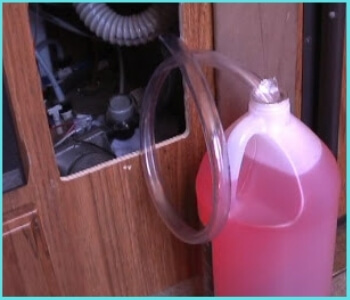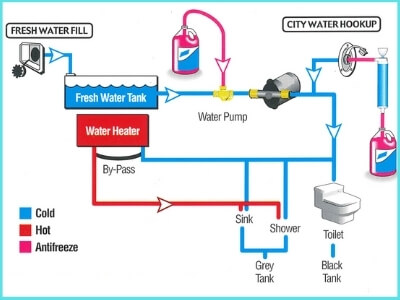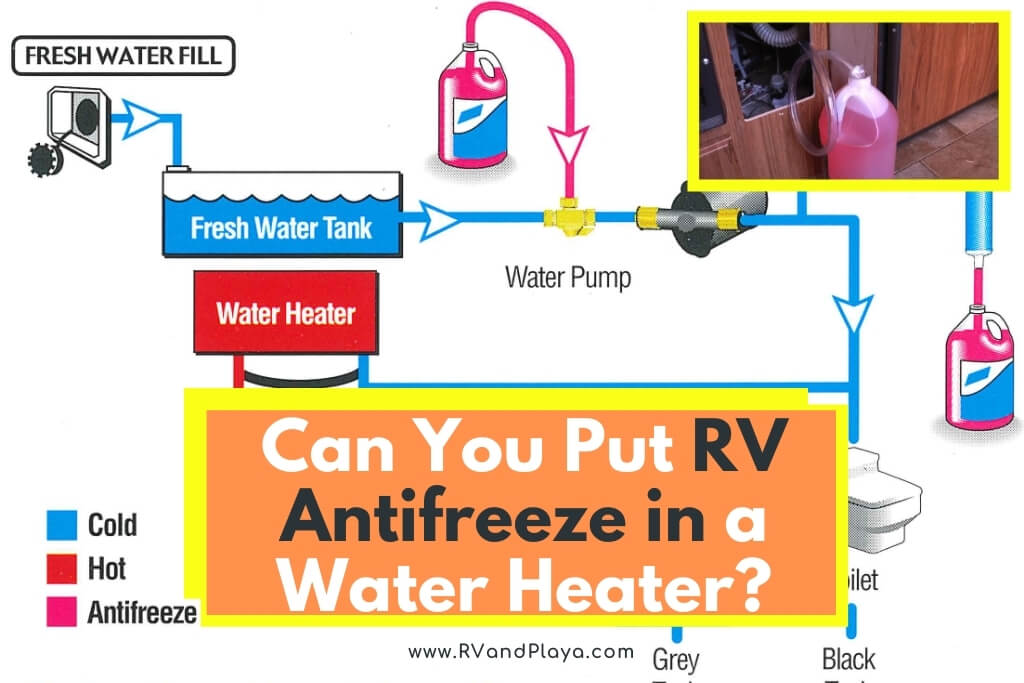It’s time to winterize that RV. Getting things ready for cold weather is an important maintenance step each fall. One of the most important is draining and adding antifreeze to the water lines, both hot and cold, in your RV.
Many people ask the question. “Can I put RV antifreeze in the water heater tank?”
Can you put RV antifreeze in a water heater? Yes, you can put RV antifreeze in your water heater tanks. BUT! And this is a big but. Why would you want to put antifreeze in your RV water heater tank? Simple draining the tank will protect the water of your heater from damage and you won’t face the problems associated with RV antifreeze in the water heater tank.
Adding antifreeze to your water heater tank won’t hurt it. However, it can pose problems when next season when you drain the antifreeze.
Extra effort and steps will be required to remove the antifreeze from the water heater tank. It is also wasteful.
We’re examine why use that extra 5 to 7 gallons of antifreeze if it isn’t necessary?
Read: How Often Should I Drain My RV Water Heater? [The Trught]
Table of Contents
Your RV Water Heater Tank – Designed to be Efficient
Unless your RV is more than 10 or 12 years old, your RV probably came with one of the new efficient and economical designs.
On some newer RV’s the water heaters are tankless. The new water heater designs on RV’s include a bypass valve.
The purpose of the bypass valve is to allows you to quickly drain the water from the tank when you winterize the water system on your RV.
A properly drained water heater tank on your RV precludes the chances of the tank suffering damage from a freeze. If there is no water in the tank to freeze, there is no chance of damage.
I’m sure there are lots of good water heater and I haven’t done a head-to-head test or anything, but the one I ended up buying is this Suburban – 5117A Water Heater and I’m happy with it.
It not only fits all of those criteria, it’s half the cost of what comparable Water Heaters sell for at Camping World (the local RV place here in Meridian, Idaho).
Purchase: If you are interested in this Suburban – 5117A Water Heater then just follow the link to Amazon where you can see current pricing.
How do I Know if I Have a Bypass Valve?
There are several easy ways to determine if your RV has a bypass valve.
- Ask the dealer where you bought the RV
- Check the owner’s manual for your RV
- Check the plumbing on the water heater tank
The dealer or the dealer’s technical staff can tell you if your RV water heater tank has a bypass valve. You may even accomplish this with a phone call.
Just be sure to have the model number and serial number from your RV handy.
The owner’s manual that came with your RV will also have this information. The first place to check is in the winterizing section.
The instructions there are the best guide to winterizing your RV.
Read also: Does RV Antifreeze Go Bad? Shelf Life of Antifreeze
As a last resort, you can open the compartment door and look at the water heater in your RV.
A bypass valve and drain valve are relatively easy to spot.
- Locate the water heater unit in the RV. You may need a small flashlight.
- Find the water inlet and outlet lines attached to the water heater.
- Look for the valves on these two water lines and perhaps for a third valve near the tank water inlet.
- Three Valve System – If you find three valves, turn the two valves on the water lines so that they are perpendicular to the water lines. Turn the valve near the tank parallel to the line. Water will now bypass the tank on the water heater.
- Two Valve System – If there are only two valves on the water lines and no valve at the tank, turn the two valves on the water lines, so they are parallel to the water lines. In this position, you will bypass the water heater tank on your RV
- Single Valve Systems – Some bypass systems only have one valve. Turning this single valve will bypass the water tank on your RV and allow you to winterize the system without filling the tank with RV antifreeze.
With the water tank bypassed, you can fill your RV water lines with antifreeze without filling the tank on your water heater.
Remember to drain the water heater tank entirely as part of your winterizing project.
My Older RV Doesn’t Have Bypass Valves – What do I Do?
Don’t despair. Your RV dealer can install a water heater bypass system for you.
There are also kits on the market that allow RV owner’s to self-install a bypass system on an RV water heater. The installation is usually painless.
The tubing on most RV water systems is plastic or vinyl. The kits include all the fittings and extra tubing. Just follow the instructions.
Related reading: Can I Use My RV Toilet in the Winter or In Cold Weather (Yes, Here Is How)
I Have a Tankless Water Heater. Should I fill it with RV Antifreeze?
Our best advice is to read the instructions. Some tankless water heater manufacturers do require that the water lines in the tankless water heater be winterized just like the rest of your RV water lines.

Some have drain valves and only require draining and no antifreeze.
What are the Down Sides to just Filling my Water Heater Tank with Antifreeze?
On older RV’s this was a common practice and for many RV owners, it still is. However, there are some downsides to this practice.

- Waste and Expense – The cost of that extra 5 to 7 gallons of RV antifreeze that it tanks to fill your RV water heater tank may not seem like much. However, over time the expense can add up. Why spend those few extra dollars when there is no real need?
- Time and Effort – Next spring, when it is time to get your RV ready for that first trip, you will need to drain the water heater tank and make sure that any residual antifreeze flushes from the tank. The antifreeze may still leave an odor and a taste in your water system that can take time to fade away
- The antifreeze may Damage the tank on your water heater – Some water heaters in RV’s have small anodes in the tank to help alleviate the problems with corrosion and the build-up of crude in the water heater tank. Some manufacturers recommend not putting antifreeze in the tank to avoid damaging this anode. Read the manufacturer’s recommendations.
Is RV antifreeze dangerous to Drink?
Check the label on the antifreeze. It would be best if you only used antifreeze in your RV water system that is made from propylene-glycol and labeled for use in RV water systems.
Still, you shouldn’t drink this stuff.
You can ingest trace amounts of these types of RV antifreeze safely. However, any of these kinds of chemicals taken in large amounts can be dangerous.
The minimal amounts of RV antifreeze that may remain in your RV water system after you prepare for another season of use are probably safe unless you have some allergic reaction to the chemical
The best practice is to use only RV antifreeze that is labeled for that sort of use and then to thoroughly purge and rinse the system each spring before your first trek in your RV.
Follow the manufacturer’s guidelines that came with your RV and those listed on the antifreeze containers.
Before the First Freeze and Before You Hit the Road
Maintaining your RV is a big part of RV ownership. Properly winterizing your RV, especially the water system, is critical to keeping your RV ready for use each year.
Related reading: 5 Practical Ways To Unfreeze Water Lines In RVs (That Actually Work)
Draining the water heater tank and filling the water lines, fittings, and faucets with RV antifreeze is a big part of this process.
Whether or not your RV water heater has bypass valves or not, following the manufacturer’s recommendations is the best way to ensure that your RV water system keeps performing year after year without problems.
My recommendation:
I really like Camco RV Antifreeze Concentrate. It’s not terribly expensive but gets amazing reviews. Just follow the link to Amazon where you can see current pricing.
Recent Posts
Is Toyota Remote Connect Free? (Subscription, Services Plans)
Does Toyota Remote Connect have an included trial? It used to be the case that, when you bought a new car, you made one straightforward payment and that was it. Now, it feels like there are...
Toyota Safety Connect: What It Is And Why You Need It? Whether you’re buying a new Toyota or you’ve had one for a while you will have been given the hard sell on their Connected Services but do...


